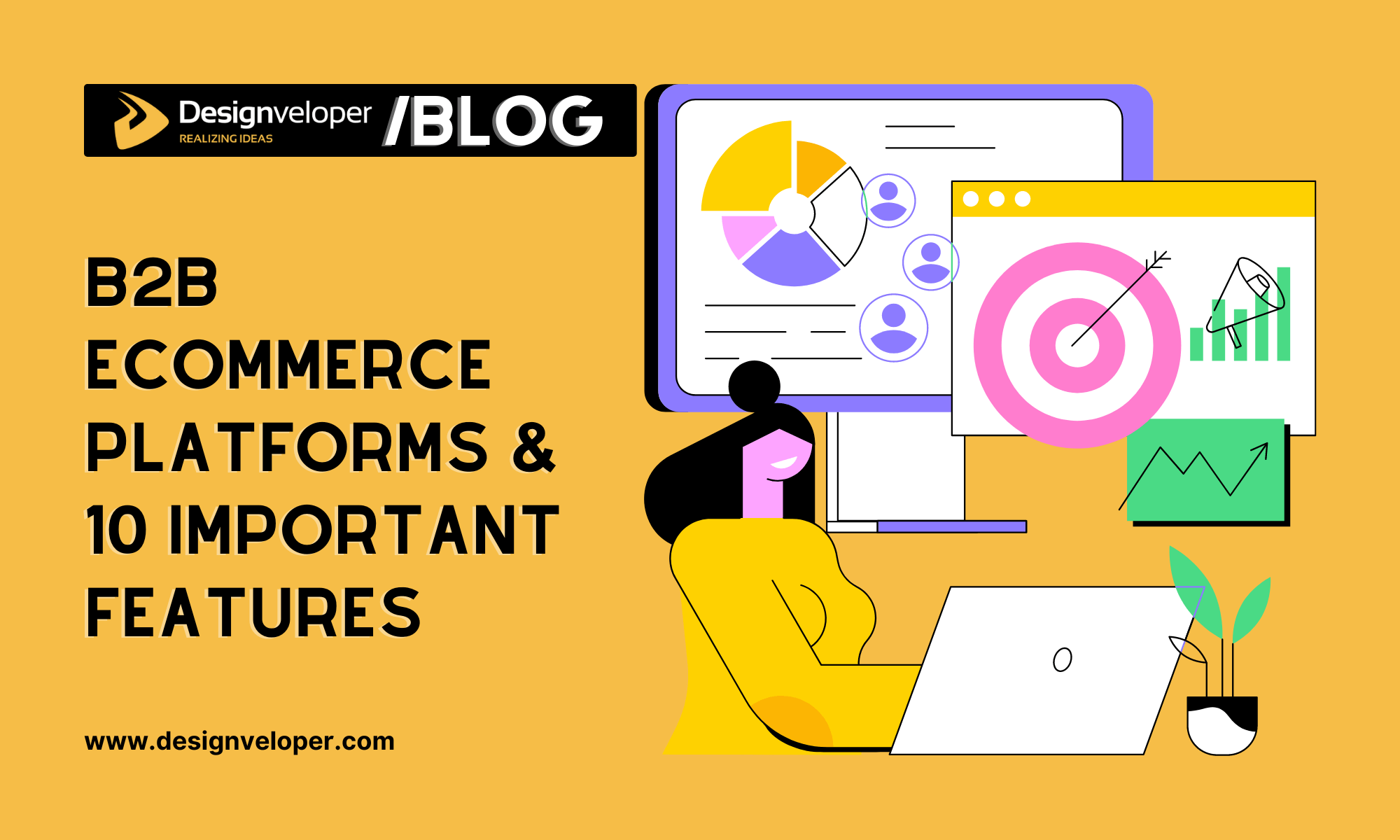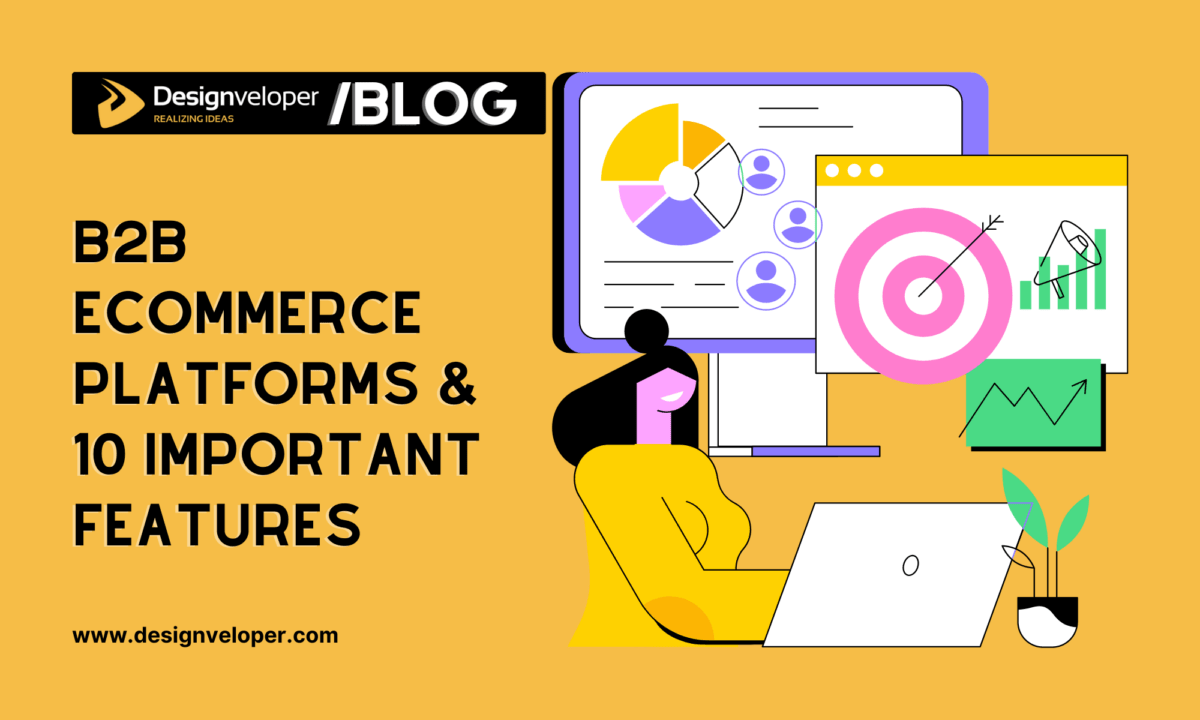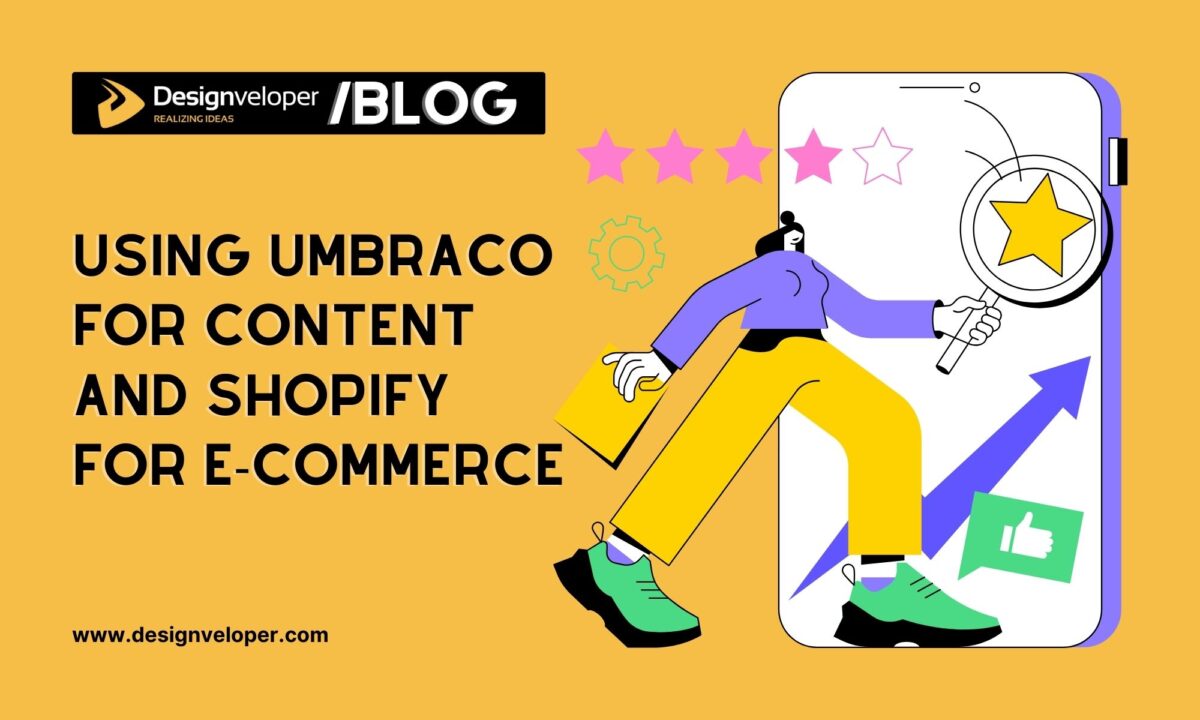
It’s no secret that the eCommerce business has changed retail as we know it. Customers now expect a more personalized experience and will only purchase from brands they trust. And with the rise of social media and mobile shopping, this is one expectation that can be fulfilled. So what is a B2B eCommerce platform and how does it work? What are some important features to consider when looking for B2B eCommerce? Let’s find out in this article!
What Is a B2B eCommerce Platform?
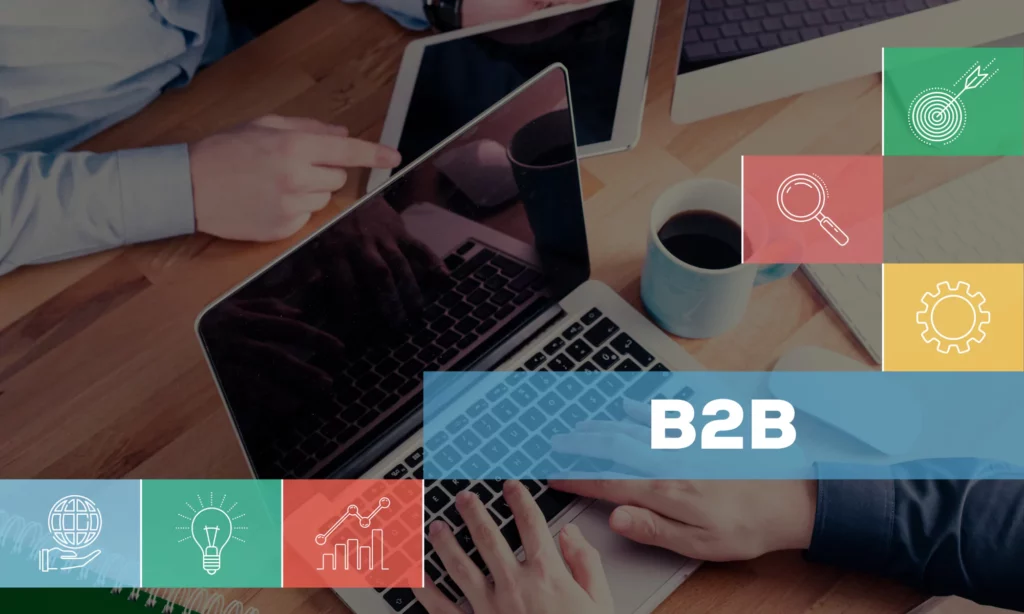
A business-to-business (B2B) eCommerce platform is simply an online shopping cart that other companies, such as wholesalers or distributors, can use to move inventory through the ordering process. It works by managing all aspects of your business within its system – from marketing and customer service to merchandise management and financials. Therefore, it provides all essential features for online sales, including marketing tools, order management, and customer service.
Recommended reading: What is B2B Ecommerce? All You Need to Know about B2B Ecommerce
Most big-name online businesses like eBay or Amazon leverage B2B eCommerce platforms. But B2B platforms can also be useful for startups or smaller companies that need help with their operations. B2B platforms
A couple of popular B2B eCommerce platforms include:
- Wix: Best known for its website creation tool. This platform also has a full range of support services and eCommerce tools for merchants.
- Shopify Plus: This dedicated B2B eCommerce platform is developed by Shopify – one of the world’s most prominent eCommerce platforms with over one million eCommerce websites.
And many more like BigCommerce, Oracle SuiteCommerce, WooCommerce B2B, and Pepperi.
How Can B2B eCommerce Platforms Help Your Business Grow?
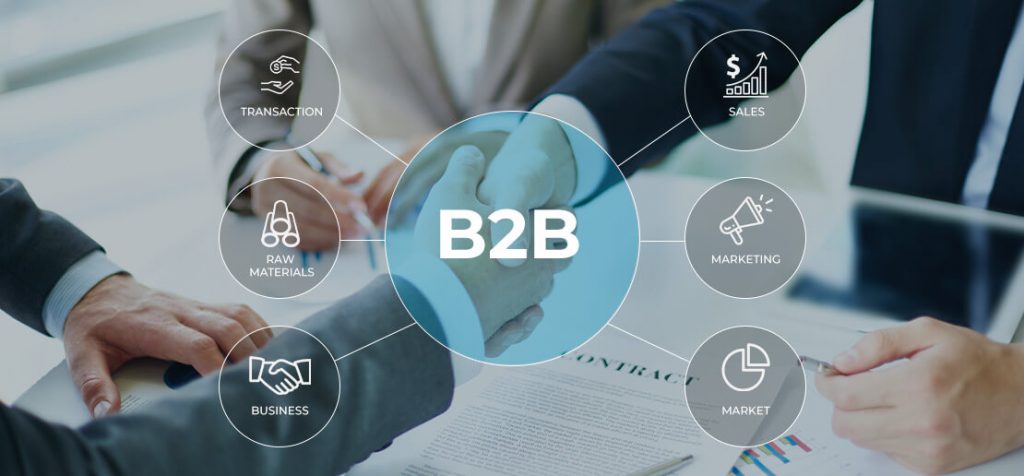
Today, B2B eCommerce platforms play a crucial role in building your online presence and contribute to your business growth. One research study predicted that the global B2B eCommerce market will exceed $13.5 trillion in 2025. This growth results from the benefits it brings to both suppliers and buyers.
Recommended reading: How to Build an eCommerce Website Fastest in 2023
For Sellers
If you plan to digitize your trading activities but find eCommerce website development costs surpass your budget, building a store in B2B platforms is a money-saving and effective option.
These platforms offer powerful tools like store management, customer account management, and purchase orders to help you create an online store without coding knowledge. They even allow for advanced analytics and integration with your current systems (e.g., ERP) to get deep insights into sales performance and streamline operations.
Further, they come with security best practices and scalability to protect your confidential data while enabling your later expansion. They also partner with reliable courier companies to ensure timely delivery to your clients’ door.
For Buyers
B2B eCommerce platforms benefit not only sellers but also buyers. Accordingly, these platforms allow buyers to look for verified suppliers and compare them to get the best options. Further, eCommerce platforms also simplify the purchasing process by enabling buyers to check a vendor’s inventory, request quotes, place orders, and track shipments. With these platforms, buyers don’t need to spend much time looking for reliable suppliers while being protected by general regulations of B2B eCommerce platforms (e.g., contract law).
Recommended reading: 9 Elements of Ecommerce Website That Boost Your Sales
Top 10 Important Features for a Great B2B eCommerce Platform
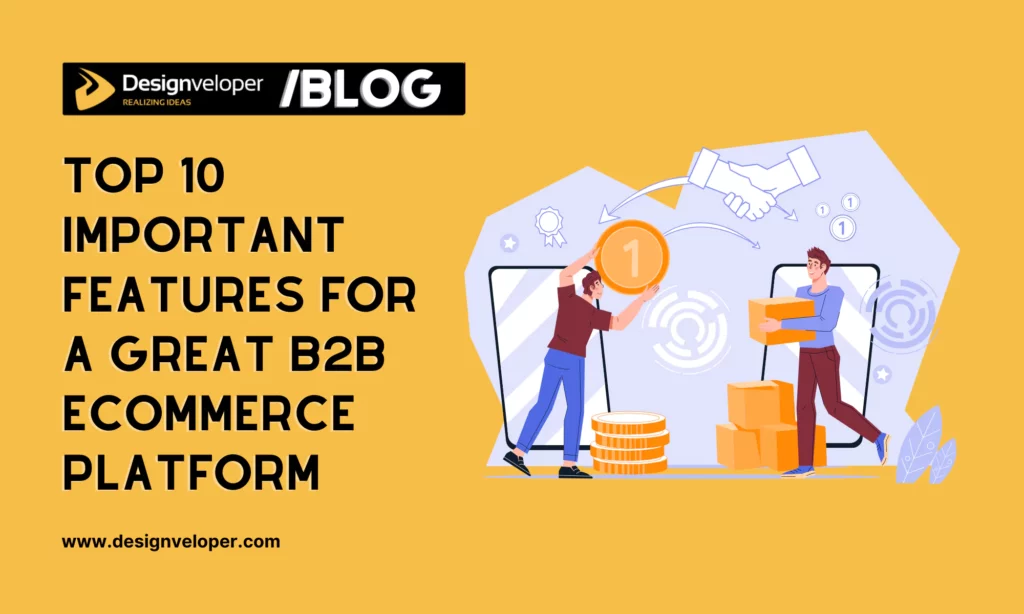
Among many other things, here are some important features that you should consider when you are looking for a B2B eCommerce platform.
1. Access Controls, Roles, and Permissions
B2B transactions often involve various stakeholders in your company, each with different levels of authority. Further, these transactions often relate to sensitive business data, like pricing, order details, or customer information.
To ensure seamless collaboration between different stakeholders and secure confidential data from any threats, a B2B eCommerce platform must offer robust access controls (e.g., authentication) and allow your company to assign the right roles (e.g., admins or sales reps) and permissions (e.g., viewing product catalog). This enables authorized individuals to access the right information and functions.
Recommended reading: How to Choose the Best eCommerce Platform for Your Need?
2. Order Management
Unlike B2C eCommerce, B2B transactions often handle bulk orders, with customized pricing, various approval steps, and recurring purchases. Therefore, a good B2B eCommerce platform needs to have a robust order management feature.
This order management functionality must allow your business to customize order workflows to varying B2B buying needs (like negotiated contracts or bulk discounts), track inventory levels instantly, automate order processing, and keep buyers updated about their shipments or possible delivery times.
FURTHER READING: |
1. eCommerce Infrastructure That You Should Know |
2. Ecommerce Website Builder: Choosing the Right Platform for Your Online Store |
3. Customer Account Management
B2B companies often deal with bulk orders and look for long-term relationships. Therefore, good B2B eCommerce platforms need to integrate powerful features to manage customer accounts effectively. These features often allow your business to perform simple actions (like adding and grouping customers) or complex manipulation (like customizing purchasing options or implementing account-based analytics).
Such B2B eCommerce giants as Shopify Plus also enable you to manage tax exemptions for resellers, automate invoicing, customize account registration forms, and implement order approval effectively. With customer account management, your business can manage all customers, along with their information, past purchases, and invoices in a unified place. This not only saves time and effort but also streamline operations.
4. Integration with Other Systems
B2B eCommerce platforms need to seamlessly integrate with your current systems (like CRMs or accounting software) and cloud-based eCommerce solutions (like Salesforce or Marketo) through APIs to synchronize data in real-time. The smooth integration removes the need for manual data entry. This minimizes errors in order processing, inventory updates, invoicing, and many more. Further, it ensures accurate customer data, product availability, and pricing to avoid order delays and offer instant insights for informed decision-making.
FURTHER READING: |
1. |
|
5. Personalized B2B Catalog Management
B2B eCommerce platforms can manage product catalogs personalized for different customer groups. Accordingly, the platforms allow different customer groups to access relevant products with correct pricing, quantity, and item types based on agreements.
For this reason, your company can hide specific products or pricing from uncertified buyers or unregistered users. Besides, the platforms provides advanced search and filtering options to help your buyers find products easily based on availability, bulk ordering options, and specs.
Personalized catalogs are also integrated with your enterprise systems to sync product information, inventory levels, and pricing updates in real-time.
6. Multiple Price Lists
One of the outstanding features in B2B eCommerce platforms is flexible price lists. Pricing in B2B transactions is often complex as it varies based on negotiated contracts, item volumes, or specific industry demands. Accordingly, the price flexibility feature of B2B eCommerce platforms allow your customers see the prices that match their agreements.
Besides, they enable market or region-based pricing, which means different market conditions or geographic locations will have varying prices. They even can automatically alter prices in real-time. This helps your business react promptly to demand or market shifts.
7. Multiple Shopping Lists

Many B2B platforms feature multiple shopping lists for your business to use, letting you provide upsells to customers. In addition, most allow you to keep your list private, meaning that only you and your immediate team can access it. This means that you have full control over what you share with your customers, allowing you to market directly to them.
Additionally, you’ll likely find that you’ll want to add customer reviews into your system, letting them be used by your team for customer satisfaction purposes. Most B2B eCommerce platforms also offer Customer Favorites. This nice feature lets you have a section in your store where you can put up pictures of previous purchases that have helped you make a sale.
8. Segmentation & Custom Reports
B2B eCommerce platforms often allow your business to segment clients based on their purchase history, geographic location, industry, and contract terms. With advanced reporting tools, you can track client actions like which products they are viewing, adding to, or removing from carts. The data, coupled with other key insights like sales performance or inventory patterns, enables your marketing team to measure the effectiveness of their marketing strategies. Then, they can optimize marketing strategies and offer account-based promotions tailored to each customer group.
9. Self-Service Options
Normally, B2B companies have to implement complex buying processes with high-value transactions and repeat orders. To reduce the burdens for your sales and support teams while ensuring efficiency, B2B eCommerce platforms often come with self-service options. This feature enables buyers to monitor their accounts and orders actively without the help from customer support agents. For example, your clients can update company details, place quick reorders, track real-time delivery status, and check invoices.
10. Flexible Custom Workflows
Different companies have different business workflows. Therefore, a good B2B eCommerce platform often integrates automation and customization to help your business tailor workflows and involve various decision-makers. Particularly, these features allow you to automate order approvals and processing, client onboarding, inventory updates, etc. to accelerate workflows while minimizing errors.
Conclusion
The internet has completely changed how we buy and sell products. With the rise of eCommerce platforms, it’s never been easier to purchase a product you need without leaving the comfort of your home.
With so many B2B eCommerce platforms on the market, it can be hard to know which one is right for you. So, consider our list of the top 10 must-have features and evaluate your overall goal to choose the best one for your business.
And if you want to build a successful B2B eCommerce website with essential features to boost conversion, Designveloper is here to help you. We offer a wide range of services from web development and mobile application to business consulting. Don’t worry much about development costs. Tell us now for free estimations! Or if you want to upgrade your business with this latest technology, contact us now and discuss your idea further.






Read more topics




























